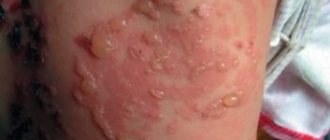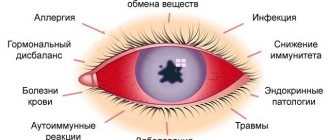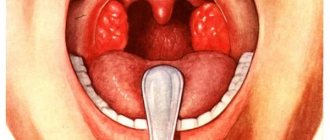- Outpatient department
Outpatient department » - Gastroenterology
Gastroenterology »
- About the direction
About the direction »
- Gastritis: symptoms, diagnosis and treatment
Gastritis is perhaps the most common disease of the gastrointestinal tract. Almost every second resident of our country suffers from it. That is why it is so important to know the first signs and symptoms of this disease in order to start treatment on time and not neglect your health.
Gastritis (from the Latin gastritis, from the ancient Greek γαστήρ (gaster) - “stomach” + -itis inflammatory or inflammatory-dystrophic changes in the mucous membrane) is a collective concept that is used to refer to various inflammatory and dystrophic changes in the gastric mucosa. Damage to the mucous membrane can be primary, considered as an independent disease, caused by poor nutrition, and secondary, caused by other infectious and non-infectious diseases or intoxication.
Types of gastritis
The largest division of gastritis is acute and chronic. The first occurs immediately after irritating factors come into contact with the gastric mucosa. In case of improper nutrition, it manifests itself in a catarrhal form, in case of poisoning or infection - in a fibrinous form.
Chronic is often caused by the bacterium Helicobacter pylori. The disease is characterized by a sluggish course with periodic exacerbations. Based on the localization of the inflammatory process, the following forms are distinguished:
- antrum - in the lower part of the stomach;
- fundal - in the middle section (sometimes extends to the bottom of the organ);
- reflux gastritis - in the area of the pylorus of the stomach.
The chronic type of the disease is characterized by dysfunction of gastric secretion. Its excessive activity causes increased acidity (this form is called hyperacid). With secretory insufficiency, acidity is reduced (this form is called anacid).
Diet for gastritis, what can and cannot be eaten?
Nutrition for gastritis depends on the form and course of the disease. In case of acute gastritis and exacerbation of chronic gastritis, a strict diet is indicated; in the remission phase of chronic gastritis, the diet can be expanded. For any type of gastritis, alcohol, smoking, fried, fatty, and spicy foods are strictly excluded. You should also never go hungry.
What you can and cannot eat depends on the type of gastritis: if the acidity of the stomach is increased, it must be reduced, and if gastritis occurs with atrophy of the mucous membrane, it is necessary to stimulate the functioning of the remaining glands.
Types of damage to the mucous membrane
Gastritis can also be classified according to the degree of change in the gastric mucosa. The mildest form is superficial, when the inflammatory process affects only the upper part of the mucosa. More dangerous forms include the following:
Although hyperplastic gastritis is characterized by the appearance of neoplasms, they are predominantly benign.
The atrophic form often leads to stomach cancer. Each of these types can be focal or diffuse: the first covers a small area of the mucous membrane (although there may be several of them), the second spreads over its entire surface.
Types of gastritis by etiology
The mucous membrane of the stomach can become inflamed for various reasons. Gastroenterologists, according to this criterion, divide diseases into several groups:
There are also mixed types. Thus, AC inflammation means that reflux is caused by autoimmune factors. It happens that autoimmune effects are combined with Helicobacter pylori infection. Then we are talking about AB gastritis.
Complications
Gastritis in adults (with the exception of phlegmonous gastritis) does not belong to the group of dangerous diseases. However, gastritis gives rise to dangerous complications:
- Stomach bleeding
- Peptic ulcer of the stomach and duodenum,
- Stomach cancer.
The effect of gastritis on the body as a whole is explained by a disorder of the digestive process. Patients with gastritis begin to “fear food”, lose weight, some vomit most of the food they eat, or suffer from heartburn after eating. Against the background of gastritis, vitamin deficiency and anemia often develop.
Causes of acute gastritis
This disease appears suddenly. In rare cases, the cause may be the bacteria Helicobacter pylori entering the body. But usually it does not make itself felt instantly, but is the causative agent of sluggish chronic gastritis.
It is usually not difficult for an adult to determine the cause. It is enough to analyze what he ate and drank several hours before the attack. Inflammation can be caused by:
Infections can also cause an attack. Among the most likely, gastroenterologists identify cytomegaloverus, syphilis, and staphylococcus infection. People with weakened immune systems are more likely to become infected. Another reason for the development of an acute inflammatory process is exposure to bile. This only applies to type C gastritis.
Diagnosis and treatment of gastritis at the TN Clinic.
To establish a diagnosis of gastritis, in addition to the typical symptoms, it is necessary to perform a gastroscopy, which can be done for you at the TN-Clinic. In order to accurately determine the type of gastritis, a highly qualified gastroenterologist, based on the described complaints, if necessary, will prescribe a series of tests to identify the bacterium Helicobacter pylori (the pathogen that provokes the development of chronic gastritis), determination of the acidity of gastric juice, a biopsy, etc. All studies are carried out during the gastroscopy procedure .
Based on the results of the examination, the gastroenterologist will develop an individual treatment plan, which includes drug therapy and a special diet. Drug treatment is prescribed taking into account all factors: acidity, the presence of Helicobacter, severity of pain, etc. A special diet is developed by a professional nutritionist. When drawing up a nutrition program, a nutritionist takes into account data from tests, examinations, individual characteristics of the body, the course of the disease, possible concomitant pathologies and other factors. In the future, following a properly formulated diet will help avoid relapses of gastritis, normalize digestion and eliminate painful symptoms.
Contact us and your problem will not remain unattended.
Your questions are answered
Ustinov Alexander Vasilievich
Gastroenterologist, hepatologist. Doctor of the highest category.
How is the diagnosis of gastritis confirmed or excluded?
Answer
During gastroscopy, material (biopsy) is taken for histological examination. Based on the results of this study, the diagnosis of “Gastritis” is confirmed or not. This is the only way to confirm the diagnosis.
What is the treatment for gastritis?
Answer
It all depends on the form of gastritis. Treatment can be medicinal or non-medicinal. For some, a diet, physiotherapeutic treatment or special exercises will be enough. Some will need to take medication. The doctor will be able to prescribe treatment after conducting a study (gastroscopy).
From whom and how is helicobacter pylori infection transmitted?
Answer
Helicobacter pylori is transmitted through the fecal-oral route, from a sick person to a healthy person, mainly to children. For adults, no. Helicobacter pylori becomes infected in childhood. Once it is treated, re-infection does not occur.
Is it possible to completely cure chronic gastritis, or will you now have to go on a diet for the rest of your life?
Answer
It all depends on the form of gastritis. Atrophic gastritis is difficult to cure, but it is also possible. Some forms of gastritis do not require diets. Much more important is regularity of nutrition. Frequent meals, in small portions 3 to 5 times a day. more useful.
What complications can occur with gastritis?
Answer
Acute gastritis can cause bleeding. The chronic form of gastritis can develop into cancer.
What examination needs to be done? Are there any tests that need to be taken?
Answer
If it is necessary to confirm the diagnosis of gastritis, then gastroscopy with biopsy.
Is it possible to inherit gastritis?
Answer
Practically no, impossible. There are very rare forms of gastritis that can be inherited, but such cases are isolated and very, very rare.
What is atrophic gastritis?
Answer
Atrophic gastritis is the most unfavorable form of gastritis. It most often degenerates into cancer.
Can gastritis turn into an ulcer?
Answer
Gastritis itself cannot degenerate into an ulcer. These are different diseases. But against the background of gastritis, it is much easier for an ulcer to arise.
Causes of development of chronic gastritis
The second most important cause of chronic inflammation of the gastric mucosa (after the bacterium Helicobacter pylori) is poor nutrition. This includes not only harmful products. Violation of the eating schedule is also detrimental to the stomach. Inflammation can result from:
The influence of other diseases (endocrine, metabolic, infectious, hypoxic) cannot be excluded. External factors (harmful working conditions, stress) also become causes of gastritis.
What bad habits can cause gastritis?
The most common cause of gastritis is the habit of eating poorly and chewing food poorly. Poor nutrition should be understood as: drinking coffee and sweets on an empty stomach, non-compliance with the diet, abuse of smoked, fatty and spicy foods. Surely you have noticed that if you chew your food poorly and quickly “push it down” (seemingly full), then this is self-deception. Then, of course, there will be a feeling of discomfort in the stomach, pain, etc.
General signs of gastritis
Regardless of the type (acute or chronic), it always manifests itself as pain in the epigastric region (only its nature differs). Pain appears after eating or, conversely, from hunger. Other symptoms from the digestive system are possible:
Symptoms in adults are more severe than in children. In children, attacks are often accompanied by weakness, fever, and bruises under the eyes. Parents may confuse the first signs of gastritis with poisoning.
Another noticeable symptom of many types of this disease is a white (less often yellow) coating on the tongue. It is not cleaned during normal hygiene procedures. In most cases, plaque indicates a decrease in acidity.
When to see a doctor
You should consult a doctor if you feel severe pain with gastritis of the stomach, since exacerbation of gastritis can cause a serious deterioration in health with an increase in the area of mucosal damage and transition to an ulcerative state. Gastritis is especially dangerous if there is increased acidity, since the juice tends to corrode the mucous membrane of the organ, resulting in the formation of ulcers. If, based on a number of signs, the patient has identified an exacerbation of gastritis, the symptoms of which are nausea to vomiting, complete loss of appetite, fever up to 39 degrees Celsius and severe pain, you should make an appointment with a specialist as quickly as possible.
Gastritis, the symptoms and treatment of which may vary in adults, is diagnosed by a gastroenterologist. The Center for Modern Medicine JSC "Medicine" (academician Roitberg's clinic) in Moscow offers diagnostic and treatment services for all types of gastritis using modern medical devices and drugs. More complete information on the topic “gastritis and its treatment in adults” can be obtained by clicking on the link. Our clinic is located at 2nd Tverskoy-Yamskaya Lane, building 10, a 5-minute walk from the Mayakovskaya metro station.
How to treat the disease
Since there are many types of gastritis, and each of them has its own causes, you cannot limit yourself to one treatment method. To combat each provoking factor, appropriate drugs are needed.
The doctor must determine by characteristic signs whether the patient’s acidity is increased or decreased. Depending on this, a suitable treatment regimen is selected.
Treatment of gastritis is usually complex, it is carried out in the following areas:
If the bacterium Helicobacter pylori is detected, it is important to eradicate it (complete destruction) with antibiotics. This is necessary to eliminate ulcerations, accelerate their healing and prevent the development of peptic ulcers and stomach cancer.
How is acidity level determined?
The main acid found in the stomach and determining its acidity level is hydrochloric acid. It is produced by parietal cells. The alkaline components of gastric juice neutralize hydrochloric acid. They are produced by accessory cells of the mucosa. The two substances interact and the acidity level changes throughout the day.
You can find out its level using intragastric pH-metry. To do this, a thin probe with a measuring electrode is placed into the patient's stomach. It gradually moves deeper and shows the pH in different areas of the organ.
In the part of the stomach where acid is produced, in an adult patient the pH should be from 1.6 to 2.0, and in the zone of alkali production and acid quenching - up to 5.2.
The doctor also pays attention to the symptoms. With high acidity, the patient suffers from heartburn, belching and a burning sensation in the throat; with low acidity, the patient suffers from bloating, flatulence and bad breath.
What can you drink?
Let's look at some common drinks:
- Milk is easily digestible and reduces stomach acidity. However, milk should not be used as a remedy - only as an addition to solid food. The thing is that milk, being liquid, does not stay in the stomach for a long time, reducing acidity for a short time, it stimulates the secretion of gastric juice to a greater extent.
- Weak tea - it is advisable to drink it when the tea has cooled and become warm.
- Juices – it is advisable to exclude acidic juices: orange, grapefruit, apple, grape. Preference should be given to juices with pulp: peach, banana, apple, pear, tomato. It is not advisable to drink juices chilled; it is better to drink them warm or at room temperature.
- Kissel – partially neutralizes the acidity of gastric juice. However, it should not be consumed as a medicine, only as part of the main meal.
- Mineral waters - preference should be given to alkaline mineral waters: “Essentuki No. 17”, “Essentuki No. 4” and “Semigorskaya”, “Borjomi”.
Treatment of acidity disorders
If there are signs of low acidity, replacement therapy with enzyme preparations is prescribed. Its main task is to normalize the production of pepsin. Preparations containing acedin-pepsin help with this. Drug stimulation of gastric juice secretion is also necessary.
If the diagnostic results reveal increased acidity, the patient is prescribed antacids. They neutralize acid, weaken the activity of pepsin, and in some cases have an enveloping effect. To eliminate symptoms, medications are recommended that stimulate gastrointestinal motility and relieve spasms of smooth muscles. Additionally, you can use folk remedies - herbs, flax seeds, potato juice.
Why are gastroprotectors needed?
To prevent complications such as peptic ulcers and malignant tumors, it is important to keep the structure of the mucous membrane intact. Gastroprotectors are used for these purposes:
They should be taken when signs of gastritis appear. The doctor will determine which medications will fit into the selected treatment package. For prevention purposes, you do not need to drink them.
The stomach contains natural gastroprotectors - prostaglandins. They stimulate the formation of mucus, improve microcirculation and protect cells from destruction. If they are not produced enough, the gastroenterologist may prescribe their synthetic analogues. If the patient is being treated with non-steroidal anti-inflammatory drugs, drugs with prostaglandins prevent ulcerative lesions of the mucous membrane.
How to make an appointment with a gastroenterologist
You can make an appointment with a gastroenterologist at our multidisciplinary medical center at 2nd Tverskoy-Yamskaya Lane, building 10 in the following ways:
- use the form on the website;
- use the phone +7 (495) 775-73-60 around the clock.
JSC "Medicine" (clinic of academician Roitberg) also offers services to call a gastroenterologist at home and by phone +7 (495) 775-73-60 around the clock.
JSC "Medicine" (clinic of academician Roitberg) is located a 5-minute walk from the "Mayakovskaya" metro station.
Preventive measures
Since gastritis is now diagnosed not only in adults, but also in children, prevention should begin as early as possible. First of all, you should normalize your diet:
When the first symptoms of inflammation of the gastric mucosa appear, it is important to minimize (or better yet eliminate) the consumption of chocolate, coffee, spicy and fried foods.
Gastroenterologists recommend regularly checking for parasitic infestations. When they are detected, it is important to carry out timely treatment, because they often attack the digestive system.
Nutrition for low stomach acidity
For gastritis with low acidity and atrophic gastritis, an important point in the diet is the stimulation of gastric secretion. Meals should be taken at certain hours (a strict eating schedule normalizes the process of secretion of gastric juice). Food should evoke a feeling of appetite, it should be taken in a calm environment, without haste. It is important to chew food thoroughly: on the one hand, crushed food will not injure the gastric mucosa, on the other hand, while we chew, a large amount of gastric juice and saliva are produced, which contribute to the best absorption of food.
For gastritis with low acidity, you should exclude:
- salty, spicy dishes;
- mushrooms, coarse stringy meat;
- alcohol;
- foods fried in oil, baked dishes;
- cabbage, grapes and grape juice.
What can you eat if you have gastritis with low acidity:
- fish fillet from low-fat fish;
- meat: rabbit, chicken in the form of boiled meat, low-fat cutlets, meatballs; meat broths, fish soup;
- sour cream, kefir, cottage cheese, milk, cheese;
- vegetable purees, grated vegetable salads from potatoes, beets, carrots, zucchini, spinach;
- mineral water 20-30 minutes before eating.
- fruit juices (except grape), compotes, decoctions of rose hips, black currants;
Meals are taken at least 5 times a day. Therapeutic nutrition is followed for another 2-3 months after the exacerbation. The patient should be in a calm environment, with conditions for good rest and sleep. It is recommended to take vitamin and mineral supplements.









